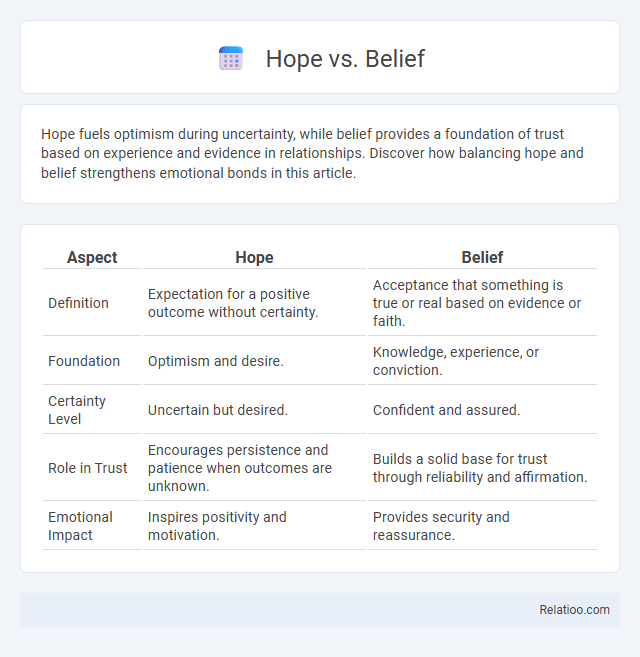Hope fuels optimism during uncertainty, while belief provides a foundation of trust based on experience and evidence in relationships. Discover how balancing hope and belief strengthens emotional bonds in this article.
Table of Comparison
| Aspect | Hope | Belief |
|---|---|---|
| Definition | Expectation for a positive outcome without certainty. | Acceptance that something is true or real based on evidence or faith. |
| Foundation | Optimism and desire. | Knowledge, experience, or conviction. |
| Certainty Level | Uncertain but desired. | Confident and assured. |
| Role in Trust | Encourages persistence and patience when outcomes are unknown. | Builds a solid base for trust through reliability and affirmation. |
| Emotional Impact | Inspires positivity and motivation. | Provides security and reassurance. |
Understanding Hope and Belief: Key Differences
Hope and belief differ fundamentally in their relationship to certainty and expectation; hope reflects a desire for a positive outcome despite uncertainty, while belief implies a stronger conviction in the truth or existence of something. Understanding these key differences enhances your ability to navigate emotional resilience and decision-making processes effectively. Recognizing when to rely on hope versus belief can improve your personal mindset and goal-setting strategies.
The Psychology Behind Hope
Hope, belief, and faith often overlap but differ in psychological impact; hope is an emotional state that motivates individuals to pursue desired outcomes despite uncertainty. Your brain activates reward pathways during hopeful thinking, enhancing resilience and coping mechanisms through positive anticipation. Belief centers on accepting something as true, while faith involves deep trust without evidence, but hope uniquely drives proactive behavior towards future goals.
The Science of Belief
The science of belief explores how neural pathways form and strengthen to create lasting convictions, showing that belief is not just abstract but deeply wired into brain function. Neuroscientific studies reveal that hope engages different brain regions, often linked to motivation and emotion, while belief activates areas responsible for judgment and memory consolidation. Understanding these distinctions helps you harness the power of belief to influence behavior and decision-making effectively.
Hope in Times of Uncertainty
Hope provides emotional resilience by inspiring optimism and comfort during times of uncertainty, allowing you to persist despite challenges. Unlike belief, which is a confident acceptance of truth or reality, hope thrives on possibilities even without concrete evidence. This emotional anchor enhances mental well-being and motivates proactive behavior when outcomes are unpredictable.
Belief as a Driving Force
Belief as a driving force empowers your actions by providing a firm conviction that transcends mere hope, grounding motivation in a sense of certainty. Unlike hope, which is often passive and uncertain, belief actively shapes decisions and sustains perseverance through challenges. This mental framework harnesses confidence and clarity, making belief a crucial catalyst for achieving goals and personal growth.
How Hope Influences Decision-Making
Hope influences decision-making by fostering positive expectations and motivating individuals to pursue goals despite uncertainty. It activates neural pathways associated with reward and optimism, which can enhance problem-solving and resilience. Unlike belief, which is a conviction about the truth of something, hope centers on the possibility of favorable outcomes, guiding risk assessment and strategic planning.
The Role of Belief in Shaping Actions
Belief is a powerful force that directly influences your decisions and actions by shaping perceptions of reality and possibilities. Unlike hope, which is more passive and future-oriented, belief drives consistent behavior grounded in confidence and conviction. Understanding the distinct role of belief enables you to harness its impact for intentional goal achievement and meaningful change.
Hope vs Belief: Real-World Examples
Hope often manifests in scenarios of uncertainty, such as patients awaiting medical test results, where optimism sustains emotional resilience despite unknown outcomes. Belief is more concrete, exemplified by people trusting scientific evidence to follow health guidelines during a pandemic. Unlike belief's foundation on evidence or conviction, hope drives motivation when outcomes remain unpredictable or beyond control.
Cultivating Hope and Strengthening Belief
Cultivating hope involves nurturing positive expectations and resilience through goal-setting and affirmations, which activates motivation and emotional well-being. Strengthening belief requires reinforcing confidence in oneself or an idea by gathering evidence, practicing consistency, and embracing a growth mindset to maintain conviction. Both hope and belief play crucial roles in mental health and achievement, with hope driving future-oriented optimism and belief providing a stable foundation of trust.
Choosing Hope or Belief: Which Matters Most?
Choosing between hope and belief impacts how you navigate challenges and set goals; hope fuels your resilience by envisioning positive outcomes, while belief anchors your confidence in certainty and trust. Hope thrives on possibilities and inspires perseverance amid uncertainty, whereas belief provides a foundation of conviction that guides decisions and actions. Understanding the dynamic between hope and belief empowers your mindset, balancing optimism with assurance to achieve meaningful success.

Infographic: Hope vs Belief
 relatioo.com
relatioo.com